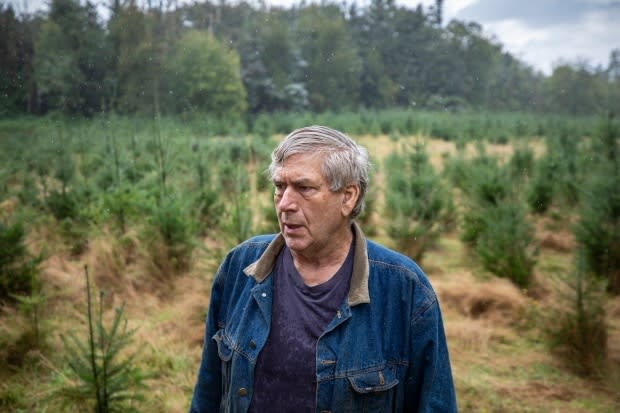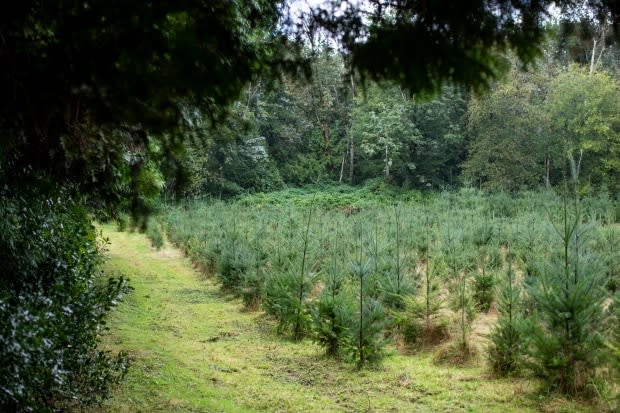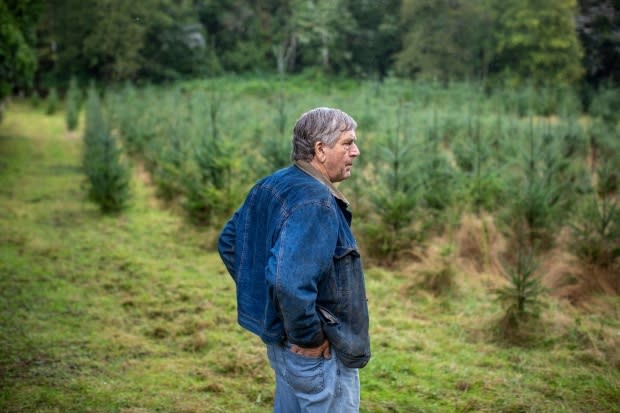When is a farm not a farm? When it's not selling Christmas trees
For a guy surrounded by Christmas trees, William Kirsch is living in jingle hell.
The Surrey Christmas tree farmer's land assessment jumped roughly 385-fold last year after he was denied "farm" classification because of what he claims is a misunderstanding over his inability to sell Christmas trees.
As a result of the change in status, the 78-year-old's 6.8-acre farm's assessed value leaped from $14,085 in 2018 to $5.459 million in 2019.
Kirsch figures the associated tax bill will cost him more than $25,000 — including $7,500 for a levy on residential property valued at over $3 million.
"What do you do?" Kirsch asks as he looks out at a field filled with Douglas firs. "There's worse horror stories out there."
Forty years of farming
The re-classification, which came to light through a Property Assessment Appeal Board decision, highlights rules that apply to farm operations on land outside the Agricultural Land Reserve.
The acreage in question sits off the eastbound lanes of the Trans Canada Highway, a stone's throw from the 192nd Street exit.
Kirsch's Christmas tree crop is visible from the road where cars whizz by.

Kirsch has owned the land for four decades and built by hand the house that sits on an adjacent property.
He says he's always run some type of farm operation but for the most part property taxes weren't much of a problem because the land wasn't valued at anything close to current levels.
Kirsch decided to start tree farming in 2012 after taking the property back from a lessee who used it for race horses.
'Some trees were ready to be harvested'
Under provincial regulations, land can be given "developing farm" status for six years while a crop like Christmas trees takes time to mature.
Once a farm is running, it has to generate $2,500 in annual sales to retain farm status.
According to the ruling, Kirsch submitted plans to plant his first 3,500 Douglas firs in 2012 with a view to generating $80,000 in sales in 2018.

But when B.C. Assessment requested a farm income statement last August, Kirsch estimated his farm's income as $0 for 2018.
He says two dry summers had stunted the growth of the crop and he didn't feel they were ready.
The assessor paid a site visit last November and disagreed. According to the ruling, she "concluded that some trees were ready to be harvested in 2018."
'If they would have told us'
This is where the confusion begins.
Although Kirsch thought the trees shouldn't be harvested last year, he says he could have sold some if absolutely necessary.
"If they would have told us, we would have made sales," Kirsch says. "If they would have said we have a concern, we would have chopped them."
Kirsch told the appeal board the same thing — but they took that to mean that he was agreeing with the assessor's verdict on the readiness of his trees.

"The evidence before me shows that while [Kirsch and his wife] have been diligently maintaining a Christmas tree farm operation since at least 2012, when trees were ready to be harvested and sold in 2018 [they] failed to do so," wrote appeal panel chair Kenneth Win.
As such, Win upheld the assessor's decision to revert the land to residential classification — and increase Kirsch's assessed value astronomically.
According to the ruling, Kirsch's only option would have been to apply to the provincial cabinet for an extension of his harvesting time.
B.C. Assessment says it is powerless to make such a change.
'They sit in their office'
Walking around the land, carefully sidestepping constant reminders that four cows also share space with the 7,000 trees on display, it's hard to deny the reality of Kirsch's Christmas tree farm.
He says this year's rain has made a huge difference and trees that were spindly last year are now full.
Kirsch says the owner of a nearby nursery wants to buy his trees next Christmas, which he figures will help to pay off the tax bill. And hopefully he'll get his farm status back again.
But no fan of the NDP government to begin with, he says he thought they would at least be sympathetic to the problems of a farmer powerless in the face of the climate.
"The problem is you have six years to grow them, irregardless of the weather," he says.
"The problem is the assessor. They sit in their office and they think that you can grow them in that amount of time."


